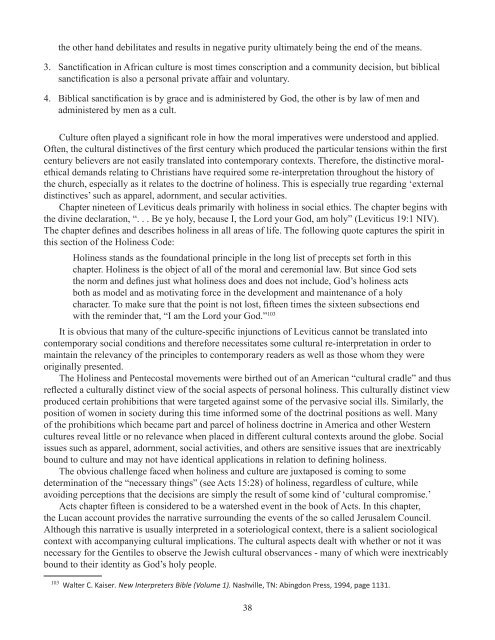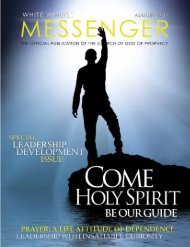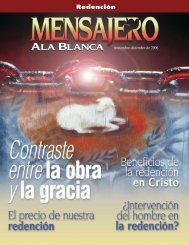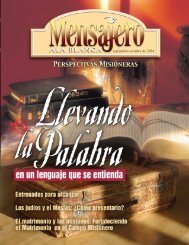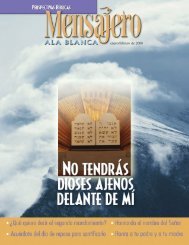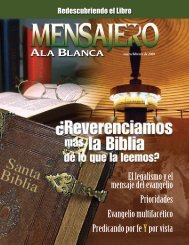The Pursuit of the Holy God - Church of God of Prophecy
The Pursuit of the Holy God - Church of God of Prophecy
The Pursuit of the Holy God - Church of God of Prophecy
Create successful ePaper yourself
Turn your PDF publications into a flip-book with our unique Google optimized e-Paper software.
<strong>the</strong> o<strong>the</strong>r hand debilitates and results in negative purity ultimately being <strong>the</strong> end <strong>of</strong> <strong>the</strong> means.<br />
3. Sanctification in African culture is most times conscription and a community decision, but biblical<br />
sanctification is also a personal private affair and voluntary.<br />
4. Biblical sanctification is by grace and is administered by <strong>God</strong>, <strong>the</strong> o<strong>the</strong>r is by law <strong>of</strong> men and<br />
administered by men as a cult.<br />
Culture <strong>of</strong>ten played a significant role in how <strong>the</strong> moral imperatives were understood and applied.<br />
Often, <strong>the</strong> cultural distinctives <strong>of</strong> <strong>the</strong> first century which produced <strong>the</strong> particular tensions within <strong>the</strong> first<br />
century believers are not easily translated into contemporary contexts. <strong>The</strong>refore, <strong>the</strong> distinctive moralethical<br />
demands relating to Christians have required some re-interpretation throughout <strong>the</strong> history <strong>of</strong><br />
<strong>the</strong> church, especially as it relates to <strong>the</strong> doctrine <strong>of</strong> holiness. This is especially true regarding ‘external<br />
distinctives’ such as apparel, adornment, and secular activities.<br />
Chapter nineteen <strong>of</strong> Leviticus deals primarily with holiness in social ethics. <strong>The</strong> chapter begins with<br />
<strong>the</strong> divine declaration, “. . . Be ye holy, because I, <strong>the</strong> Lord your <strong>God</strong>, am holy” (Leviticus 19:1 NIV).<br />
<strong>The</strong> chapter defines and describes holiness in all areas <strong>of</strong> life. <strong>The</strong> following quote captures <strong>the</strong> spirit in<br />
this section <strong>of</strong> <strong>the</strong> Holiness Code:<br />
Holiness stands as <strong>the</strong> foundational principle in <strong>the</strong> long list <strong>of</strong> precepts set forth in this<br />
chapter. Holiness is <strong>the</strong> object <strong>of</strong> all <strong>of</strong> <strong>the</strong> moral and ceremonial law. But since <strong>God</strong> sets<br />
<strong>the</strong> norm and defines just what holiness does and does not include, <strong>God</strong>’s holiness acts<br />
both as model and as motivating force in <strong>the</strong> development and maintenance <strong>of</strong> a holy<br />
character. To make sure that <strong>the</strong> point is not lost, fifteen times <strong>the</strong> sixteen subsections end<br />
with <strong>the</strong> reminder that, “I am <strong>the</strong> Lord your <strong>God</strong>.” 103<br />
It is obvious that many <strong>of</strong> <strong>the</strong> culture-specific injunctions <strong>of</strong> Leviticus cannot be translated into<br />
contemporary social conditions and <strong>the</strong>refore necessitates some cultural re-interpretation in order to<br />
maintain <strong>the</strong> relevancy <strong>of</strong> <strong>the</strong> principles to contemporary readers as well as those whom <strong>the</strong>y were<br />
originally presented.<br />
<strong>The</strong> Holiness and Pentecostal movements were bir<strong>the</strong>d out <strong>of</strong> an American “cultural cradle” and thus<br />
reflected a culturally distinct view <strong>of</strong> <strong>the</strong> social aspects <strong>of</strong> personal holiness. This culturally distinct view<br />
produced certain prohibitions that were targeted against some <strong>of</strong> <strong>the</strong> pervasive social ills. Similarly, <strong>the</strong><br />
position <strong>of</strong> women in society during this time informed some <strong>of</strong> <strong>the</strong> doctrinal positions as well. Many<br />
<strong>of</strong> <strong>the</strong> prohibitions which became part and parcel <strong>of</strong> holiness doctrine in America and o<strong>the</strong>r Western<br />
cultures reveal little or no relevance when placed in different cultural contexts around <strong>the</strong> globe. Social<br />
issues such as apparel, adornment, social activities, and o<strong>the</strong>rs are sensitive issues that are inextricably<br />
bound to culture and may not have identical applications in relation to defining holiness.<br />
<strong>The</strong> obvious challenge faced when holiness and culture are juxtaposed is coming to some<br />
determination <strong>of</strong> <strong>the</strong> “necessary things” (see Acts 15:28) <strong>of</strong> holiness, regardless <strong>of</strong> culture, while<br />
avoiding perceptions that <strong>the</strong> decisions are simply <strong>the</strong> result <strong>of</strong> some kind <strong>of</strong> ‘cultural compromise.’<br />
Acts chapter fifteen is considered to be a watershed event in <strong>the</strong> book <strong>of</strong> Acts. In this chapter,<br />
<strong>the</strong> Lucan account provides <strong>the</strong> narrative surrounding <strong>the</strong> events <strong>of</strong> <strong>the</strong> so called Jerusalem Council.<br />
Although this narrative is usually interpreted in a soteriological context, <strong>the</strong>re is a salient sociological<br />
context with accompanying cultural implications. <strong>The</strong> cultural aspects dealt with whe<strong>the</strong>r or not it was<br />
necessary for <strong>the</strong> Gentiles to observe <strong>the</strong> Jewish cultural observances - many <strong>of</strong> which were inextricably<br />
bound to <strong>the</strong>ir identity as <strong>God</strong>’s holy people.<br />
103 Walter C. Kaiser. New Interpreters Bible (Volume 1). Nashville, TN: Abingdon Press, 1994, page 1131.<br />
38


